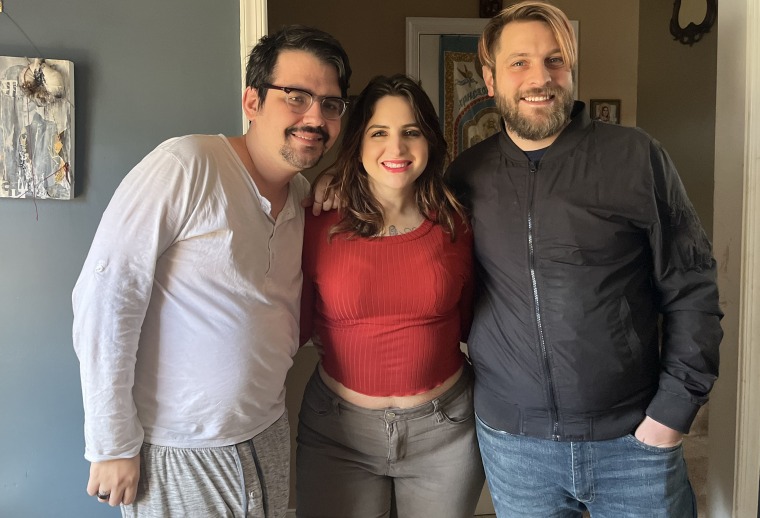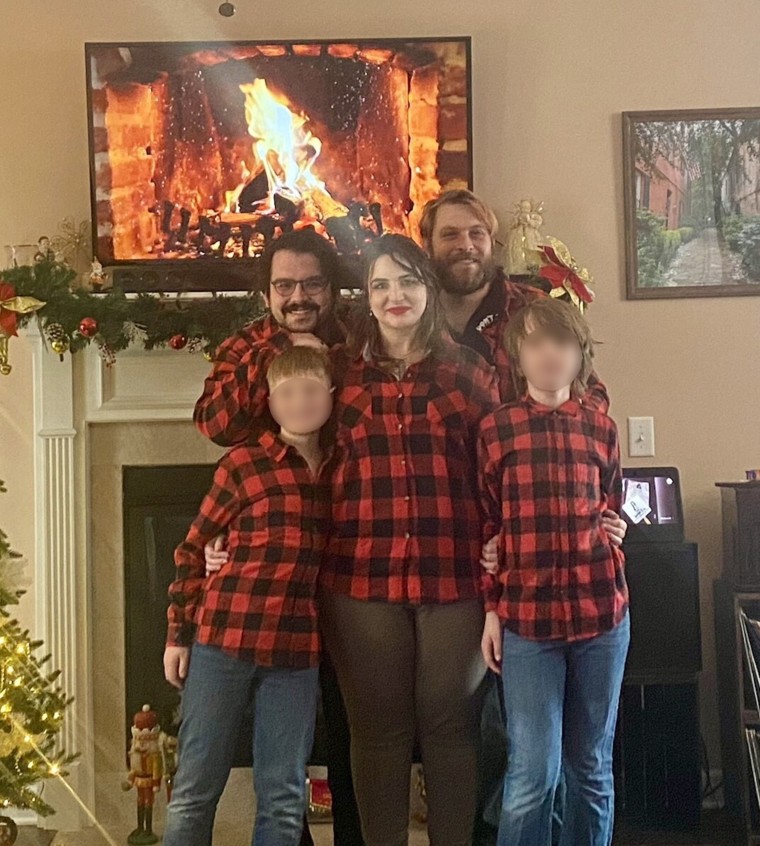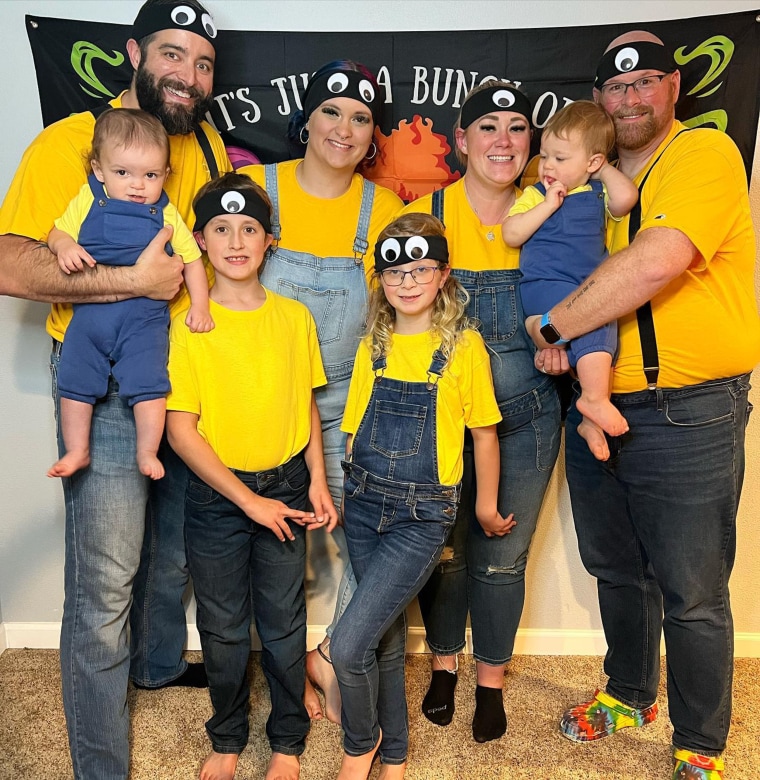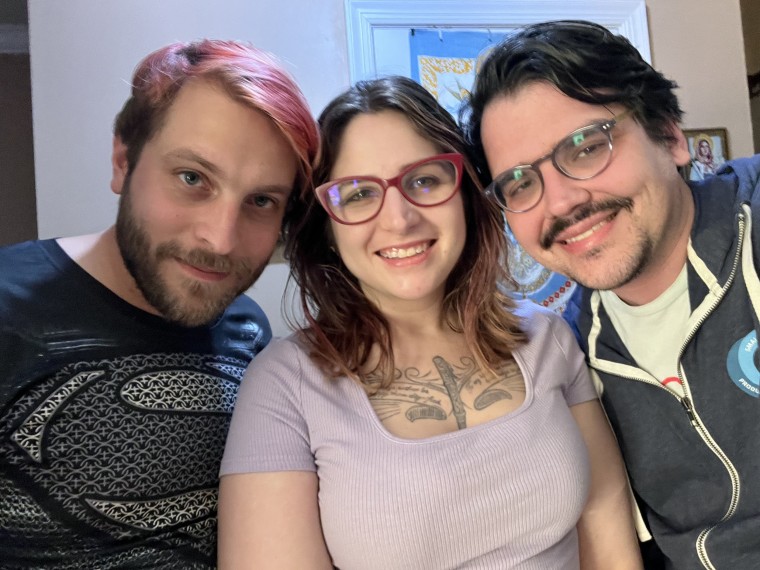As society's idea of what constitutes a family continues to expand, some parents are living in 'polyfamory' households, where multiple partners birth and care for all of their children under one roof.
Alysia Rodgers, 34, says her and her husband, Tyler, were not looking for polyamory — the term for when a person has one or more romantic partners at the same time, with the enthusiastic consent of everyone involved — when they met Sean Hartless, 46, and his wife, Taya.
"We didn't even know what polyamory was, until we started getting feelings for each other," Alysia tells TODAY.com.
Soon, Sean and Taya, 28, were driving nearly two hours to see Alysia and Tyler, 35, in their home in Oregon. Exhausted by the commute and fueled by a desire to see everyone more frequently, the couples moved into a new house together in February, 2020.
And that's how polyamory became polyfamory.
Tyler and Alysia were already parents to two children, now 7 and 8. Tyler says explaining their new living situation to the kids was "really easy."
"Our kids already knew we were dating Sean and Taya," Tyler tells TODAY.com. "We told them: 'You know mom has a boyfriend and dad had a girlfriend and we're going to move in together, and we're all going to be a big family and they're going to help parent you, so we're going to need you to treat them like you treat us — like parents.'"
Since living together under one roof, the family has added two children.
"I birthed one and Taya birthed the other," Alysia says. "We did not regulate the biology" — meaning Alysia, Taya, Tyler and Sean do not know who their 22-month-old's and 15-month-old's biological fathers are.
"We're all equal parents to all of the children and it's not up for debate or discussion," Alysia says. "It's not something that we're trying to hide from the children either. If they want to know where their DNA comes from, we will absolutely go down that path with them. But at this point in their lives, it doesn't matter."
"We wanted to do everything we could to make sure that everybody feels like an equal parent," Taya adds. "At this point, finding out their genetics would change nothing."
A rise in polyamorous relationships
Polyamorous relationships have gained popularity in recent years. One 2021 study of 3,438 single adults in the United States found that one in six respondents "wanted to be polyamorous;" one in nine have been at some point, and one in 15 said they "knew someone who was or is polyamorous."
Still, shows like "Sister Wives" — which depict polygamy, in which one person is married to multiple partners — have caused confusion and even created negative stereotypes about polyamorous families, Sean says.
"'Sister Wives' references always make us laugh, because that's practicing polygamy versus polyamory," he explains. "I think people hear the 'poly' lead in and think that it's the same thing — that's not us. We don't have a hierarchal situation here — we're all trying to be equals and not have the 'patriarch' lead the family."
Jennifer Martin, 34, agrees.
"It's missing autonomy," Jennifer says, who lives Virginia with her husband Daniel, 35, partner Ty Simpson, 32, and their two children.

"Polygamy is so different from polyamory in the sense that people ... exist for one person or one man. I wouldn't say all those situations are unhealthy, but it's definitely not what I would say a lot of polyamorous relationships look like."
Jennifer and Daniel both grew up in conservative, evangelical households, where, Jennifer says, "if you fall in love with somebody, you get married." The couple were engaged at 19, married at 20 and had two kids by the time Jennifer was 25.
"I don't even think I ever heard the word 'polyamory,'" Jennifer says. "I didn't know anybody who was non-monogamous. I didn't think that existed."
At 27, after reconsidering what she believed, Jennifer told Daniel she was feeling sexually attracted to and even in love with other people, but was not falling out of love with him, either.
"We took things really slow — we saw a counselor, read books and we went to a polyamory group," she says. "He started dating somebody before I did."
In 2018, Jennifer met Ty. In 2020, he moved in with Jennifer and Daniel and their family grew.

"One of the things that was hard for me in the beginning, was kind of shaking off the mentality that I was taking something away from Daniel and his experiences with the kids," Ty tells TODAY.com. "But it's a community. ... We all have our own roles to play, and at the end of the day, the main goal is to ensure that the kids are being raised to be kind and loving."
The good, bad and expensive side of polyfamory
Both families say there are both pros and cons to a polyfamory household.
"We have four sets of adult hands to work on things," Tyler says. "It's very rare, I think, for people to have that kind of help."
Alysia, Tyler and Sean all work full time, while Taya is a stay-at-home mom. Sean says knowing the children are always being cared for by at least one parent "is a big sigh of relief" because everyone knows "your kids are for sure taken care of by the right people."

They say their children also learn valuable lessons as a result of their family dynamic — lessons like, "relationships don't have to look a certain way," Sean says, and that however they choose to live is "100% their choice" and that their parents will "love them and support them no matter what," Alysia adds.
Jennifer says she's glad her sons are learning about "autonomy," to question traditional gender roles and how to tap into the power of community.
"We make everything in the house a communal effort," she explains. "They realize that everybody puts their weight in and has a role to play. I hope that that will form a mindset of mutual aid and community when they grow up."
Of course, polyfamory comes with some challenges: scheduling, for one.
"We have to meet weekly and our Google calendars are so chaotic," Daniel tells TODAY.com. "We have to make sure that not only can we coordinate schedules, but that people's needs are met."
Inflation and the cost of groceries is also hitting Daniel, Jennifer and Ty's family hard (much like many other big families).
"I cannot believe how much people eat in this house," Jennifer says.

Meshing different parenting styles can be difficult, Sean says.
"I tend to be a little more — some would use the word 'harsh,' I use the word 'structure,'" he explains. "I think that there's benefits to the way I do things, and there's benefits to the way they want to do things through gentle parenting. Kids are ever-changing, so if you get stuck in one style of parenting it's not going to work. I'm struggling the most with learning that, so we still have conversations about that daily."
Despite the challenges — including moments of jealousy, strangers sexualizing their polyamorous relationships and not being completely accepted by family members — both families say the pros outweigh the cons because their children benefit from having so many trusting, loving adults in their lives.
"At the end of the day, we're just like any other monogamous family — there's just four of us," Tyler says. "Being a parent is so much more than just biology, and that's what we're about."
Related video:
